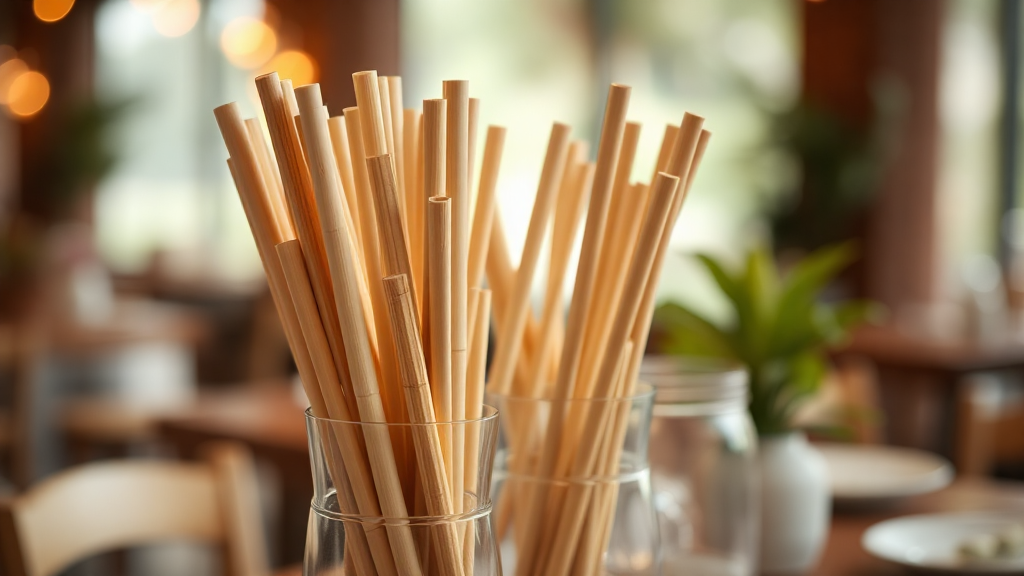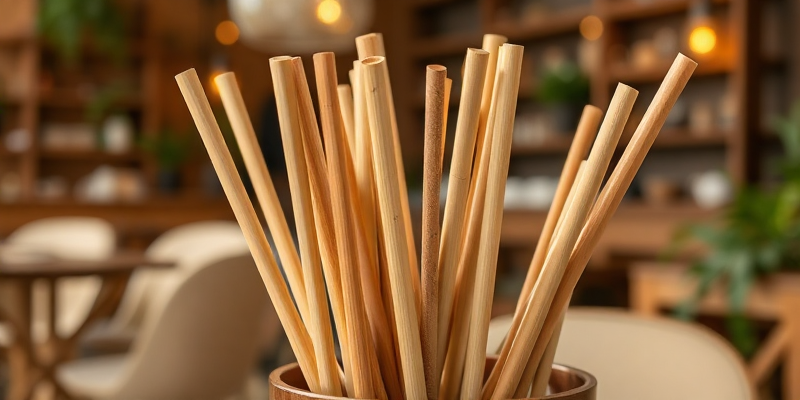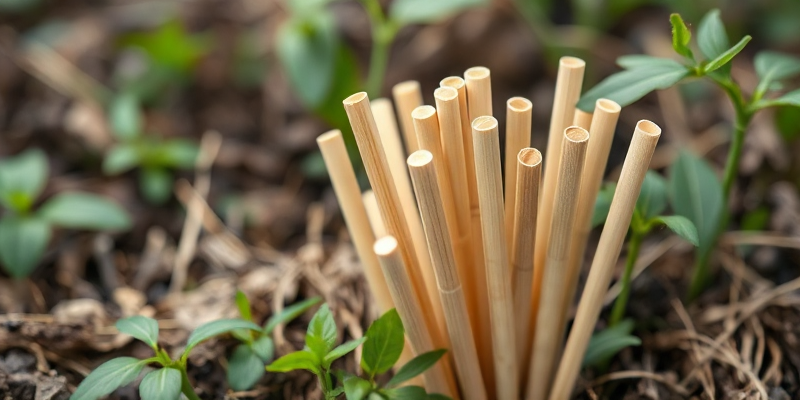Bamboo Drinking Straws: B2B Guide to Eco-Friendly & Profitable Swaps

Introduction: Navigating the Plastic Ban Era with Bamboo Alternatives

Picture this: It’s Monday morning, and your café is bustling with customers. A young professional approaches the counter, orders her usual latte, and then pauses. “Do you use plastic straws?” she asks, concern evident in her voice. This scenario is playing out in businesses worldwide as consumer consciousnes about single-use plastics continues to rise.
The global shift away from plastic straws isn’t just a trend—it’s becoming law. As of 2023, over 127 countries have introduced some form of plastic regulation, with many explicitly targeting single-use items like straws. For businesses operating acros borders, navigating this patchwork of regulations presents a genuine challenge.
Enter bamboo drinking straws: a natural, renewable alternative that’s gaining significant traction in the B2B marketplace. Unlike their plastic predecessors, bamboo straws offer a sustainable solution that aligns with both regulatory requirements and evolving consumer expectations.
What makes bamboo particularly appealing for businesses is its remarkable growth rate—bamboo can grow up to 91 cm (3 feet) in a single day, making it one of the fastest-growing renewable resources on the planet. This rapid regeneration translates to a sustainable supply chain that businesses can rely on without concerns about resource depletion.
For food service businesses, hotels, and retailers, switching to bamboo drinking straws wholesale represents more than compliance—it’s an opportunity to demonstrate environmental leadership while meeting practical needs. These straws are sturdy enough for thick smoothies yet elegant enough for cocktail service, providing versatility that many other eco-alternatives lack.
As we explore the busines case for bamboo straws in this guide, we’ll examine not just the environmental benefits, but the practical considerations that matter most to B2B decision-makers: cost implications, customer perception, regulatory compliance, and operational integration. Whether you’re a café owner, hospitality manager, or wholesale distributor, understanding these factors is crucial to making informed purchasing decisions in today’s eco-conscious marketplace.
Explore the evolution of drinking straws from plastic to eco-friendly alternatives to gain historical context for this important busines transition.
Regulatory Compliance: FDA & LFGB Certifications for Bamboo Drinking Straws

For B2B buyers, regulatory compliance isn’t optional—it’s essential. When purchasing bamboo drinking straws wholesale, understanding certification requirements can protect your busines from potential legal issues and consumer concerns.
The FDA (Food and Drug Administration) certification is particularly critical for food-contact items in the US market. This certification ensures that bamboo straws meet stringent safety standards for materials that come into contact with food and beverages. According to the FDA’s food contact substance guidelines, materials must be manufactured under specific conditions and free from harmful chemicals that could migrate into food or drinks.
What many businesses don’t realize is that non-compliance with FDA regulations can result in severe penalties—in 2022 alone, the FDA issued over $20 million in fines to businesses for food contact violations, underscoring the financial importance of choosing properly certified products.
Similarly, in European markets, LFGB (Lebensmittel- und Futtermittelgesetzbuch) certification provides assurance that products meet German food safety standards, which are often considered among the most rigorous in the world. For international businesses, having products that meet both FDA and LFGB standards ensures market acces acros multiple regions.
When sourcing FDA certified bamboo straws for B2B use, request documentation that verifies:
- Laboratory testing results
- Manufacturing proces compliance
- Absence of harmful chemicals
- Supply chain transparency
A real-world example comes from a global coffee chain that faced significant backlash after introducing bamboo straws without proper certification. The resulting product recall and negative publicity cost the company an estimated $1.3 million—a costly lesson in the importance of regulatory due diligence.
NatureBioEco’s bamboo drinking straws come with comprehensive certification documentation, making compliance straightforward for businesses navigating complex regulatory environments acros multiple markets.
Learn more about incorporating eco-friendly straws into your sustainability strategy while maintaining regulatory compliance.
How Bamboo Drinking Straws Compare to Other Eco Alternatives

For busines decision-makers, understanding how bamboo straws stack up against other sustainable options is crucial for making informed purchasing decisions. Let’s break down the key comparisons:
| Feature | بانس کے تنکے | کاغذ کے تنکے | PLA Straws | Metal Straws |
|---|---|---|---|---|
| ——— | ————— | ————– | ———— | ————– |
| پائیداری | 3-6 months with proper care | Single-use (1-2 hours) | Single-use | Years (lifetime) |
| Biodegradability | 100% home compostable (4-6 months) | 100% compostable (2-3 months) | Industrial composting only | Not biodegradable |
| User Experience | Natural feel, neutral taste | Can become soggy | Similar to plastic | Temperature conductive |
| Cost (per 1000 units) | $80-120 | $50-70 | $40-60 | $1,000-1,500 |
| Customization | Limited branding options | Excellent printing options | Good printing options | Engraving options |
| Perception of Luxury | اعلی | کم | Medium | اعلی |
The data shows bamboo offers a compelling middle ground. While paper straws remain the most widely adopted eco-alternative, research from the Sustainable Packaging Coalition reveals that 78% of consumers report dissatisfaction with their performance, particularly when they become soggy in beverages.
According to a 2023 restaurant industry survey, establishments that switched from paper to bamboo straws saw a 23% reduction in customer complaints about straw performance, demonstrating bamboo’s practical advantage in real-world use cases.
For businesses serving cold beverages, bamboo’s structural integrity makes it particularly advantageous. Unlike paper straws that deteriorate quickly in iced drinks, bamboo maintains its structure throughout the customer experience. This is especially relevant for businesses like smoothie shops and cocktail bars where straw performance directly impacts customer satisfaction.
The UNEP’s report on plastic alternatives also highlights bamboo’s favorable lifecycle assessment compared to other alternatives when considering factors like water usage, carbon footprint, and end-of-life scenarios.
When considering bamboo vs paper straws for businesses, the initial cost difference should be weighed against customer experience and brand perception benefits that bamboo provides. While paper may offer a lower upfront price point, the premium feel of bamboo can enhance the perceived value of your beverage service.
Discover a comprehensive analysis of various eco-friendly straw options to help determine which solution best fits your specific busines needs.
Top Busines Benefits of Switching to Bamboo Drinking Straws
For forward-thinking businesses, bamboo straws represent more than an ecological choice—they offer tangible busines advantages that contribute to both the bottom line and brand positioning.
### Enhanced Brand Perception and Customer Loyalty
A 2023 Nielsen Global Corporate Sustainability Report found that 73% of millennial consumers are willing to pay more for sustainable products and services. By prominently featuring sustainable alternatives like bamboo straws, businesses can tap into this preference. Restaurant owners report that simply mentioning bamboo straws in menu descriptions has increased orders of specialty drinks by up to 15% among environmentally conscious customers.
### Cost Effectivenes Over Time
While the initial investment in best bamboo straws for cafes may be higher than conventional plastic, the long-term economics are compelling. Consider this: A mid-sized café serving 200 drinks daily would spend approximately:
- $730 annually on single-use plastic straws
- $1,825 annually on single-use paper straws
- $1,200 first year on reusable bamboo straws, with minimal replacement costs in subsequent years
This represents potential savings of $625-$1,725 over a three-year period, not accounting for potential increases in plastic straw taxation or outright bans that could impact availability and pricing.
### Marketing Opportunity and Differentiation
Bamboo straws create organic marketing opportunities. Businesses report increased social media mentions when customers post photos of distinctive bamboo straws, generating free publicity. One boutique hotel chain documented a 22% increase in Instagram mentions after introducing branded bamboo straws in their beach bars.
### Reduced Waste Management Costs
With compostable straws bulk orders, businesses can significantly reduce their waste volume. A case study of a 200-room hotel showed waste management costs decreased by 4.7% after switching to compostable alternatives, as these items could be diverted from general waste streams to composting facilities at lower disposal rates.
### Alignment with Corporate Sustainability Goals
For larger corporations with established ESG (Environmental, Social, Governance) commitments, transitioning to bamboo drinking straws provides measurable progres toward sustainability targets. This becomes increasingly valuable as investors and stakeholders scrutinize corporate environmental performance.
Discover effective strategies for marketing eco-friendly straws to your customers to maximize the busines benefits of your sustainable switch.
Environmental Impact: Why Bamboo Drinking Straws Wins
The environmental case for bamboo straws extends far beyond simply avoiding plastic pollution—it represents a fundamentally different approach to resource utilization and lifecycle management.
Bamboo’s environmental credentials are remarkable. As a gras rather than a tree, bamboo reaches maturity in just 3-5 years compared to 30-50 years for most timber species. This rapid growth cycle translates to exceptional carbon sequestration capabilities—bamboo forests absorb 35% more carbon dioxide per hectare than equivalent timber forests, according to research from the International Network for Bamboo and Rattan.
What’s particularly significant for businesses making sustainability claims is bamboo’s minimal cultivation requirements. Unlike many crops, bamboo:
- Requires no pesticides or fertilizers
- Needs minimal water (approximately 1/3 that of cotton)
- Prevents soil erosion with its extensive root system
- Regenerates naturally without replanting
For businesses calculating their Scope 3 emissions (indirect emissions in the value chain), switching from plastic to bamboo straws can contribute to meaningful reductions. A medium-sized restaurant chain switching to bamboo straws can prevent approximately 1.5 tons of plastic waste annually—equivalent to removing the emissions from about 3,300 miles of car travel.
The end-of-life scenario for bamboo straws also presents significant advantages. While plastic fragments into harmful microplastics that persist for centuries, bamboo drinking straws completely decompose in home composting conditions within 4-6 months, returning valuable nutrients to the soil.
A particularly striking statistic comes from marine conservation efforts: In 2023, beach clean-up organizations reported that 17% of all plastic items collected were straws or stirrers. By adopting bamboo alternatives, businesses directly contribute to reducing this specific source of marine pollution.
Learn how long sustainable straw alternatives last compared to conventional options to better understand the full environmental implications of your busines choices.
Case Study: Bamboo Drinking Straws Succes in Action
### Ocean View Resorts: Transforming Guest Experience Through Sustainable Choices
When Ocean View Resorts, a collection of five luxury beachfront properties acros Southeast Asia, decided to eliminate single-use plastics from their operations in 2022, they faced a particular challenge with drinking straws. Their signature tropical cocktails required sturdy, reliable straws that wouldn’t compromise the guest experience.
After testing various alternatives, they partnered with NatureBioEco for a customized bamboo straw solution. Here’s how the implementation unfolded and the measurable impact it created:
#### The Challenge
- Serving approximately 1,500 beverages daily acros all properties
- High standards for guest experience and presentation
- Tropical climate with high humidity affecting straw performance
- Brand requirement for premium, photogenic beverage presentation
#### The Implementation
Ocean View Resorts ordered 30,000 custom bamboo drinking straws with their logo subtly etched near the top. The straws were provided in various lengths and diameters to accommodate different beverage types, from water service to specialty cocktails.
Staff received training on proper handling and storage of bamboo straws, and tent cards explaining the sustainability initiative were placed on tables and bars throughout the properties.
#### The Results
The switch to bamboo drinking straws generated remarkable outcomes acros multiple busines metrics:
1. **Guest satisfaction scores** related to beverage service increased by 18% within the first quarter after implementation.
2. **Social media engagement** showed a 27% increase in branded hashtag usage, with guests frequently photographing and commenting positively on the bamboo straws.
3. **Waste reduction** achieved 941 kg of plastic waste eliminated annually acros all properties.
4. **Staff engagement** surveys revealed that 83% of employees felt greater pride in the company following the sustainability initiative.
5. **ROI analysis** showed the program reached profitability within 11 months when accounting for increased beverage sales, positive PR value, and waste disposal savings.
The most surprising finding came from guest surveys, where 64% of respondents specifically mentioned the bamboo straws as a memorable element of their stay—proving that small sustainable touches can create outsized impressions on customer experience.
“What started as an environmental initiative quickly became a signature brand element,” noted Maria Chen, Sustainability Director for Ocean View Resorts. “The bamboo straws have become part of our identity and created conversations with guests about our broader commitment to protecting the environments where we operate.”
Discover how to choose the right eco-friendly straws for your specific busines needs to achieve similar succes with your sustainability initiatives.
اکثر پوچھے گئے سوالات
- What certifications should I look for when ordering bamboo drinking straws wholesale?
- For B2B purchases, prioritize straws with FDA certification for US markets and LFGB certification for European markets. These ensure food-contact safety. Additionally, look for certifications verifying sustainable harvesting practices, such as FSC (Forest Stewardship Council) or USDA Organic certification for the bamboo source. NatureBioEco provides complete certification documentation with all wholesale orders.
- How should businesses properly care for and store bamboo straws?
- To maximize the lifespan of your bamboo straws, store them in a dry, ventilated container after thorough cleaning and drying. For cleaning, rinse immediately after use, then wash with mild soap and warm water using a straw brush. Avoid soaking bamboo straws for extended periods, and never put them in dishwashers. In commercial settings, implementing a rotation system ensures straws dry completely between uses.
- What is the typical lifespan of bamboo drinking straws in commercial use?
- With proper care, bamboo drinking straws typically last 3-6 months in commercial settings. Factors affecting longevity include frequency of use, cleaning protocols, and beverage types (acidic drinks may reduce lifespan). Many businesses implement replacement schedules, rotating in new straws quarterly while composting old ones.
- Can bamboo drinking straws be customized with our busines logo?
- Yes, bamboo straws can be customized with your busines logo through laser etching, which creates an elegant, permanent brand impression. Custom length and diameter options are also available to match specific beverage offerings. Keep in mind that custom orders typically require minimum quantities (usually 1,000+ units) and additional lead time of 2-3 weeks.
- How do bamboo straws compare cost-wise to plastic straws for large-scale busines use?
- While bamboo straws have a higher upfront cost ($80-120 per 1,000 vs. $10-15 per 1,000 for plastic), they offer better economics when considering regulatory factors. Many regions now impose plastic straw taxes ($0.05-0.10 per straw), and plastic bans can require costly menu repricing. Additionally, businesses often report 5-8% increased sales of premium beverages when promoting eco-friendly servingware, offsetting the higher initial investment.
- Are bamboo straws suitable for all beverage types served in my busines?
- Bamboo straws work excellently with most cold beverages including water, soft drinks, iced coffee, and cocktails. They’re especially







